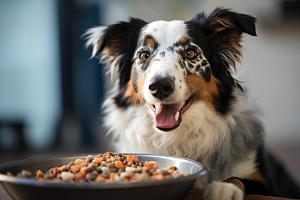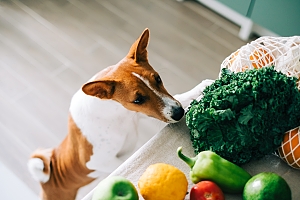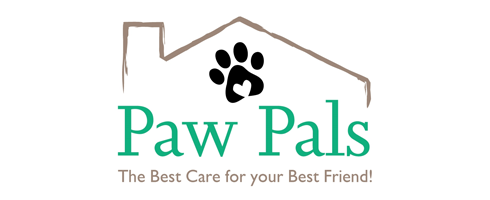Navigating the vast realm of dog nutrition can be daunting, especially with the abundance of misinformation circulating on the internet. As pet owners, the bond with our canine companions is profound, making it essential to separate fact from fiction to avoid inadvertent health issues.
Our goal is to debunk prevalent myths surrounding dog nutrition, providing a clearer understanding of what should and shouldn’t fill Fido’s bowl.
Trust Your Veterinarian
 One cannot emphasize enough the importance of relying on a trustworthy veterinarian when it comes to your pet’s nutrition. Establish a relationship with a high-quality veterinarian who understands your pet’s unique dietary requirements.
One cannot emphasize enough the importance of relying on a trustworthy veterinarian when it comes to your pet’s nutrition. Establish a relationship with a high-quality veterinarian who understands your pet’s unique dietary requirements.
If your furry friend has specific health conditions, such as weight problems, diabetes, or allergies, your vet’s recommendations become invaluable. Trust their expertise to guide you in feeding your pet the right diet aligned with their individual needs.
Myth #1: “Organic” is Better
The term “organic” holds a certain allure, often associated with health and well-being. However, when it comes to dog nutrition, the label “organic” lacks standardized regulations. While some organizations offer certifications, the absence of industry-wide legislation allows any pet food company to brandish the term without adhering to the rigorous standards applied to human-grade organic products.
Pet owners should recognize that a package labeled “organic” is not a guarantee of true organic quality. Furthermore, the dearth of solid scientific evidence raises doubts about whether dog food based on organic ingredients genuinely offers discernible health benefits for our pets.
Myth #2: Avoid Grains and Corn in Dog Food
A prevalent myth circulating in the pet food industry advises against including grains and corn in dog food. Often perpetuated by companies offering premium dog foods at higher prices. However, scientific backing for this myth is conspicuously absent. Claims about the harmful nature of grains and corn revolve around the concept of allergies.
While it’s true that some dogs may be allergic to these ingredients, the same holds for any other components found in pet food, including various meats. The idea that grains and corn universally lead to allergies is an oversimplification, urging pet owners to approach these claims with a discerning eye.
Myth #3: Premium is Always Better
Pet food companies frequently market the idea that higher-priced dog food equates to superior quality and enhanced health benefits. However, this myth is a strategy to boost profits rather than a reflection of nutritional value. While certain premium brands may indeed offer nutritious options, the label “premium” does not guarantee a universally superior product.
Price alone is not a reliable indicator of a dog food’s quality. To ensure optimal nutrition for your pet, it is crucial to scrutinize ingredient labels, focusing on the specific nutritional needs of your dog rather than succumbing to marketing tactics.
Myth #4: Feeding Your Pet Natural Food is Better
The concept of a raw or “natural” diet for pets draws on the idea of returning to ancestral eating habits. However, the domesticated house dogs of today have evolved significantly from their wild ancestors. Feeding pets raw foods poses potential health risks, as raw meats may harbor harmful pathogens, including parasites and bacteria. Most domesticated pets lack exposure to these pathogens, leaving them vulnerable to illness.
Moreover, dogs raised on commercial pet food may not possess the necessary enzymes to efficiently digest raw meat. While an occasional treat of raw meat may not be harmful, a complete switch to a raw diet could result in serious gastrointestinal distress.
Myth #5: Meat Meal is a Bad Thing
Contrary to popular belief, meat meal is a valuable protein source processed with attention to detail. The misconception that it is a harmful ingredient stems from misunderstanding. Meat meal comes from high-quality protein sources and undergoes the same meticulous processing as pet foods labeled with whole meats.
The protein quality remains consistent, and there is no scientific evidence indicating any health detriments from incorporating meat meals into your pet’s diet. Pet owners need to distinguish between misinformation and accurate nutritional guidance to make informed decisions about their pet’s diet.
The Reality of Dog Nutrition
 In reality, most pets don’t require specialized diets unless specified by a veterinarian. Marketing claims promoting various health benefits often lack substantial evidence. Pet food companies aim to profit, and it’s crucial to filter their marketing information critically.
In reality, most pets don’t require specialized diets unless specified by a veterinarian. Marketing claims promoting various health benefits often lack substantial evidence. Pet food companies aim to profit, and it’s crucial to filter their marketing information critically.
Opt for a healthy, nutritious dog food brand at a reasonable price, ensuring your furry companion thrives without unnecessary expenses. Save your money for the joy of providing your dog with a new toy, reinforcing the bond with your beloved pet.
Entrust Northern Virginia’s Top Pet Sitters
After debunking prevalent dog nutrition myths, ensure your furry friend receives the optimal care they deserve. Trust the expertise of Paw Pals Pet Sitters to follow a nutrition plan that aligns with your pet’s unique needs.
Whether it’s dispelling myths, addressing specific dietary requirements, or providing reliable guidance, our team is dedicated to your pet’s well-being. Contact Paw Pals Pet Sitters today to schedule a PetTech-certified sitter.


